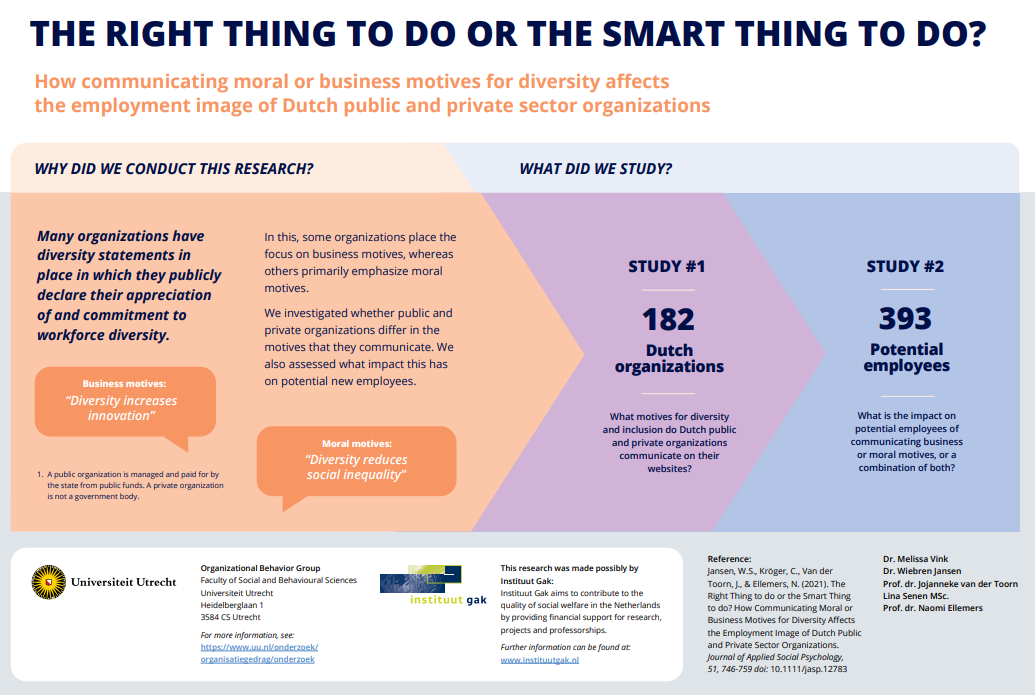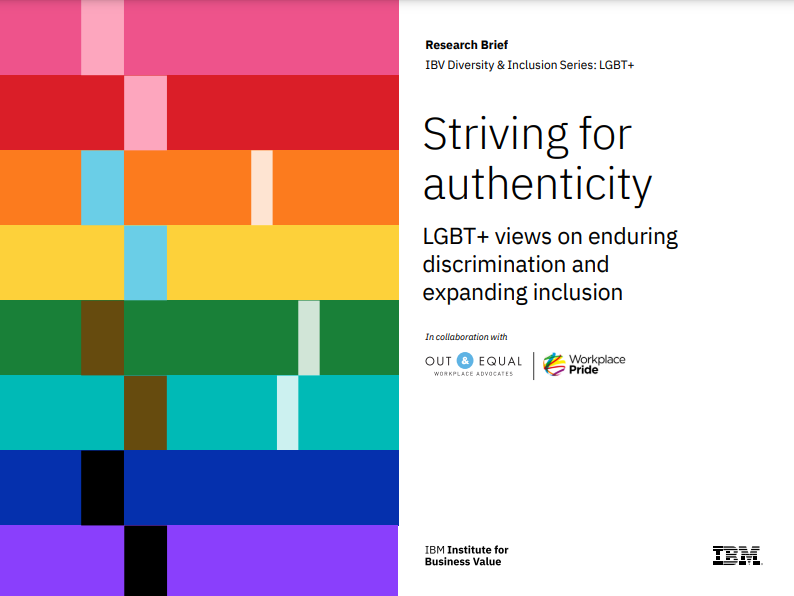In September 2021, we presented the conclusions from the comparative research our team at Utrecht University conducted on organizational efforts toward an inclusive work climate, in collaboration with the Netherlands Inclusiveness Monitor and SER Diversity in Practice. In order to prevent a revolving door effect, organizations should pay more attention to the promotion and retention of employees. To support organizations, we created a practical handout on formulating SMART goals.
The right thing to do or the smart thing to do?
Many organizations have diversity statements in place in which they publicly declare their appreciation of and commitment to workforce diversity. In this, some organizations place the focus on business motives, whereas others primarily emphasize moral motives. To support and motivate organizations in developing evidence-based diversity policy, we created a factsheet with a summary of the findings. For more details, check out the academic publication.
Continued support by the Goldschmeding Foundation
I am very grateful that the Goldschmeding Foundation decided to extend their support of our project “It has to work: Inclusion in the labor market through synergy of science and practice”, a collaboration between our research group at Utrecht University, SER Diversity in Practice and the Netherlands Inclusivity Monitor. After a fruitful first year, in which we investigated how diverse and inclusive Dutch organisations are and how they can continue to develop their D&I policy, this coming year we will focus on support for D&I policy in organizations. We are looking forward to the year ahead.
A report with findings from our first analyses, can be found here
A handout with insights and practical tips can be found here
Dialogue and Exchange at the LGBTIQ+ Workplace Inclusion Conference at Leiden University
On May 20th and 21st, Gaitho Waruguru and I hosted the LGBTIQ+ Workplace Inclusion Conference at Leiden University in collaboration with the Workplace Pride Foundation.
The aim of the conference was to showcase the state of the art of research on LGBTQI+ workplace inclusion, to contribute to building a diverse platform of researchers, and to facilitate the dialogue between scientists, advocates, policymakers, employers, and employees.
The conference featured keynote speeches by Dr. Lee Badgett (UMass Amherst) and Yvonne Muthoni (Kenya Open for Business), several multi-disciplinary academic sessions, as well as focused panel sessions that brought together researchers, employers, employees, practitioners and policymakers around topics relevant to LGBTIQ+ workplace inclusion, including but not limited to the challenges and opportunities that LGBTQI+ people experience in the areas of training, recruitment, selection, promotion and retention, the policies and regulations affecting these areas, as well as promising interventions and solutions.
We look back on a very exciting and insightful conference, thanks to the great contributions of our speakers, panelists and audience members from all over the world!
A visual recap of the conference by cartoonist Suus van den Akker is provided below, and a short article summarizing the first conference day is available here
Global LGBT+ Innovation Jam
I was proud to help lead the Global LGBT+ Innovation Jam, an initiative organized by IBM, Out & Equal and Workplace Pride. The discussions, and the survey conducted, helped to inform this new report on LGBT+ workplace inclusion.
A best methods approach to diversity and inclusion policy
In developing diversity and inclusion policy, HR-policymakers often copy the best practices of other organizations. But is this strategy effective? In this animation we introduce a different, more systematic method for policymakers to apply to their diversity and inclusion initiatives.
Kurt Lewin Institute Conference 2021
A year later than planned, but we were finally able to hold the Kurt Lewin Institute Conference on April 20 & 21, 2021. It was a great pleasure and honor to chair this online conference!
Keynote talks by Floor Rink, Steven Neuberg and Ellen Giebels
Four themes were highlighted this year:
Dealing with Differences - chaired by Marc Heerdink & Félice van Nunspeet
Political Psychology - chaired by Yasin Koç & Ruthie Pliskin
Motivation and Emotion - chaired by Joshua Tybur
The Psychology of Change - chaired by Jessie Koen & Wiebren Jansen
The combination of different topics and tracks led to many fruitful discussions and new overarching insights.
Rewarded for science communication!
Our research group at Utrecht University was one of the teams rewarded for our science communication efforts and received a grant from the pilot fund ‘Science communication by scientists: Appreciated!’ – set up by the Dutch Ministry of Education, Culture and Science.
Netherlands Inclusiveness Monitor - Factsheet 2019-2020
All employees can participate and are valued for who they are, irrespective of gender, age, ethnicity, sexual orientation, or religion. That is the key to being inclusive. The Netherlands Inclusiveness Monitor (NIM) investigates the initiatives that organizations take to create a more inclusive workplace. It connects these findings to the experiences of employees and provides organizations with evidence-based advice on which steps to take to become truly inclusive. On March 18 2021, we presented the latest findings on data from 20 Dutch private and public sector organizations and published a summary of findings in this handout.
Results indicate that organizations focus mostly on the selection, recruitment and inclusion of employees and less on the promotion and retention of employees. In addition, organizations could pay more attention to developing and implementing their policy in an integrated, systematic and evidence-based way. Practical recommendations are provided.
LGBTIQ+ Employee Resource Groups: What does the science say?
LGBTIQ+ employees face unique challenges at work such as suffering poorer mental and physical health than their heterosexual colleagues. Employee Resource Groups (ERGs) can play an important role in supporting LGBTIQ+ employees and keeping them connected.
In this article for Workplace Pride, Erdem Meral and I review the academic literature on the LGBTIQ+ employee resource groups. We discuss what they are, what we know about their promises and pitfalls, and how they can be most effective, with the aim to contribute to evidence-based inclusion management in organizations.










